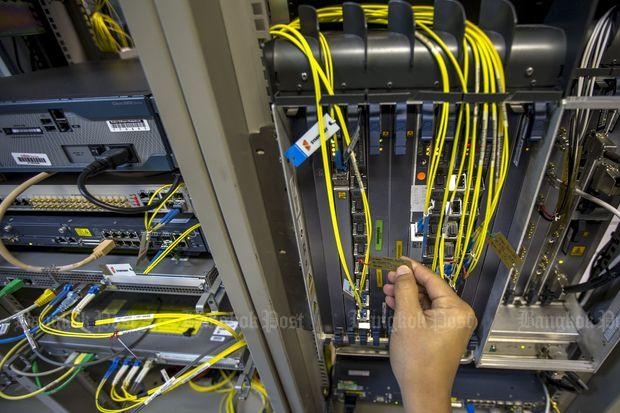
The private telecom sector has urged the government to move forward with planned tax benefits for companies that invest in submarine cable infrastructure for the internet.
The call by telecom companies follows the Information and Communication Technology (ICT) Ministry's suggestion that the Board of Investment (BoI) need not provide tax incentives for submarine cable investment.
The ministry said submarine investment is a global development through an international consortium business model, requiring highly skilled foreign workers. The submarine cable industry is dominated by global players.
"This does not comply with the BoI's established principles and policies that were designed to promote domestic investment and local employment," said Songporn Komolsuradej, permanent secretary of the ICT Ministry.
The ministry sent an urgent letter concerning the planned tax benefits to the secretary-general of the BoI in late January, she said.
"Without the tax incentives, CAT Telecom will continue to monopolise the local submarine cable market," said Prasong Ruangsirikulchai, executive director of NTT Communications (Thailand).
More importantly, the incentives will boost submarine cable investment by the private sector, eventually leading to greater bargaining power with international players and reducing the cost of international internet connections.
In addition, it could promote Thailand as Asean's digital gateway, said Mr Prasong.
CAT Telecom owns six submarine cable routes in Thailand, while TOT Plc owns two.
The two state telecom enterprises have been assigned to study the feasibility of establishing a joint venture to implement the projects for international submarine cables and digital infrastructure to serve the digital economy.
Mr Prasong said most internet traffic for private telecom companies is connected via terrestrial cable connections through Singapore and Malaysia, bypassing the submarine cable infrastructure of CAT and TOT because it is cheaper.
This enhances the competitiveness of the internet infrastructure industry of both countries, key competitors to Thailand.
"Thailand's internet service charge is at least four to five times higher than that of Singapore and Malaysia because of the high international internet connection fees charged by CAT and TOT," Mr Prasong said.
This will impede the country's ability to become a regional digital infrastructure hub and discourage global technology firms such as Google, Facebook, Microsoft and Amazon from establishing their own main server bases here.
At least five private companies have the ability to invest in submarine cable networks, Mr Prasong said.
The chief executive of a telecom company who asked not to be named said he was surprised the ICT Ministry was putting the brakes on the planned tax incentives.
"Having only two state enterprises operating submarine cable routes in the country poses a high risk of the entire internet network collapsing or of traffic bottlenecks," the source said.
The Telecommunications Association of Thailand submitted its proposal to the ICT Ministry to support digital economy creation. The association said Thailand needs to raise its global internet gateway capacity by six-fold to 60 terabits per second by 2020.